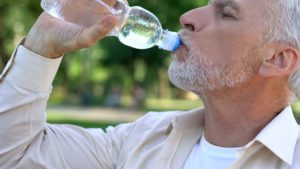How to Help Seniors Cope During a Summer Heat Wave

Many of us look forward all year to the summer heat, as it means we can finally go to the beach, take out the boat, and spend time outdoors. It’s important to realize, however, that the dog days of summer have a much different impact on our senior population.
The elderly are more vulnerable to the heat because their bodies don’t adjust well to sudden changes in temperature. Additionally, chronic medical conditions can change their body’s response to heat, and prescription medications they may be taking can impair their body’s ability to regulate temperature or even to sweat. For this reason, it’s best in most cases for seniors to stay indoors as much as possible and avoid any strenuous activities once the summer heat arrives.
The elderly also need to be more careful about overheating because they are at greater risk for heat stroke. Heat stroke is considered a medical emergency and can lead to death if the afflicted person doesn’t get help. The first signs of heat stroke are fainting or becoming unconscious, experiencing a change in behavior (confusion, agitation, staggering, or acting strangely), having a body temperature of over 104 F, not sweating even if it is hot, and having either a rapid or very weak pulse. Those over age 50 are at greatest risk of heat stroke, as are those with heart or blood vessel issues, or people who take multiple prescription drugs or are very overweight or underweight.
While heat stroke is the most severe heat-related illness, other forms of hyperthermia that can affect the elderly include heat syncope, heat cramps, heat edema, and heat exhaustion. Heat syncope, caused by being too active in hot weather, leads to sudden dizziness. Painful heat cramps can happen in the muscles of the arms, legs, or stomach as a result of too much exercise. Heat edema is swelling in the ankles and feet when a person gets too hot. Heat exhaustion, a warning that your body can no longer keep itself cool, manifests itself through feeling thirsty, dizzy, weak, uncoordinated, and nauseated. All of these conditions are resolved by resting, putting one’s feet up, and drinking lots of water.
It is important for caregivers or family members to encourage their loved ones to take certain steps to stay safe during summer heat waves. The most critical factor is to be sure they are drinking plenty of cool water, fruit juice, or vegetable juice throughout the day (even if they don’t feel thirsty). Encourage them to avoid alcohol and caffeine if possible. Older people are often not aware they are becoming dehydrated or that they need to keep drinking fluids. Eating cooling snacks such as popsicles, frozen peas, or slightly frozen grapes can also help them keep cool. It’s best to eat light, cool meals such as chicken or pasta salad rather than heavy, hot meals like pot roast.
If elderly people start to feel overheated, they should put their feet in a pan of cool water and place a cool washcloth on the back of their necks. They can also take a cool bath or shower, or cover up with a flexible ice blanket (using a towel to protect skin from direct contact). By wearing layers of lightweight clothing such as light-colored cotton, they can adjust their temperature throughout the day by removing or adding a layer.
During the hottest part of the day (11am to 3pm), seniors can keep their homes cool by keeping the shades drawn or using solar curtains. Installing an indoor or outdoor air conditioner or running a fan can also be very helpful. (Interestingly, electric fans can trick the body into thinking it’s cooler than it actually is and can do more harm than good for older adults, so the CDC recommends only using one if the temperature is below the 90s.) It’s best not to use the oven if at all possible. If the heat gets to be too much at home during the day, you can take your loved one to a cooled public place such as a senior center, shopping mall, library, or coffee shop. Opening windows at night can help cool off the house.
If seniors need to go to an appointment or somewhere else during the warmest part of the day, they should ask for help rather than waiting outside for a bus or other public transportation. Some local senior centers or Councils on Aging provide transportation service if friends, family, or caregivers are unable to help. It’s best for seniors to plan trips during non-rush-hour periods to avoid sitting in a car for long periods of time.
Before venturing outdoors, it’s always wise to check a weather report. If the temperature or humidity is going up or an air pollution alert is in effect, seniors are at an increased risk for a heat-related illness. If they start to get a headache or feel confused, dizzy, or nauseated, they should immediately get out of the sun and into a cool place. If the condition persists, they should go to a doctor or the emergency room immediately to prevent heat stroke.
Those who have elderly relatives or neighbors should think about making daily visits to check on them during hot weather. With some common sense and preventive measures, the seniors in our lives can enjoy the summer just like the rest of us, while also staying safe and healthy!
